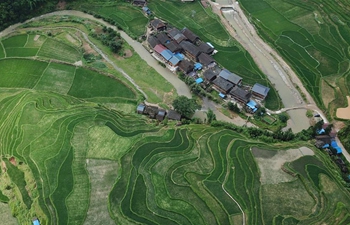LONDON, June 27 (Xinhua) -- Historic England announced Wednesday it had started the search for a site of mysterious prehistoric stones buried beneath silt in a Devon marshland.
Archaeologists hope the lost standing stones of Yelland will provide a rare insight into ceremonial and ritual practices during the Late Neolithic period to the Middle Bronze Age, over 3,000 years ago.
The two rows of prehistoric standing stones disappeared into silt in the 1980s in the Taw and Torridge estuary.
Historic England is funding new archaeological investigations in a nature reserve at Isley Marsh alongside what is known as the Tarka Trail near Barnstable in Devon.
A team of archaeologists will explore the marshes to find the lost ancient site, which disappeared from view in the 1980s after the closure of Yelland power station led to a change in the currents in the estuary and a build up of silts around the site.
The team, led by Dr Martin Bates from the University of Wales, will be working in difficult conditions between river tides, using the latest geophysical surveying techniques to explore beneath the thick blanket of silts that has covered the site.
Bates said: "We are very pleased to be working at this site, bringing our expertise developed along the Welsh coastline, to Southwest England. Our study may help to shed light on the relationship the monument builders had with the sea."
A spokeswoman for Historic England said: "The Yelland stones are a nationally important site which is protected as a scheduled monument. It includes at least 18 small stones arranged in a pair of parallel rows. In the 1930s an excavation discovered nine pairs of stones or stone sockets, a scatter of flint tools and some evidence for occupation during the Mesolithic, Neolithic and Early Bronze Age.
The site is a RSPB nature reserve run by the Royal Society for the Protection of Birds (RSPB) and is officially designed as a Site of Special Scientific Interest (SSSI) due to its overwintering and migratory populations of wading birds.
Historic England's Charlotte Russell said: "It's exciting to have the opportunity to rediscover the Yelland stones which haven't been seen in over 35 years. This is an important site to keep safe and pass on to future generations. We hope the work will reveal more about the site and the conditions in which the monument was built thousands of years ago."
Bill Horner, Devon County Archaeologist, said: "Rediscovering this unique site has been one of my team's priorities for a number of years. We now have the chance to find out so much more about this fascinating but elusive monument."
Once the stones have been located, Devon County Council Historic Environment Service, together with the RSPB and Historic England, hope to provide a new interpretation panel for the Tarka Trail to explain more the ancient history of the area.

















